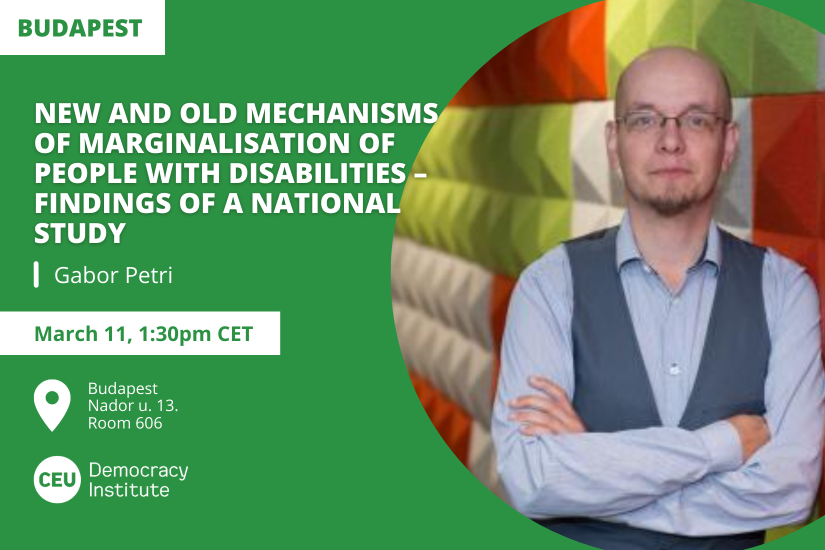
The Inequalities and Democracy Workgroup of the CEU Democracy Institute cordially invites you to its public seminar. You can check our past events here.
If you would like to attend, please register here.
Please keep in mind that external guests will not be able to enter the building without prior registration.
The seminar starts with a 25-minute presentation of the research followed by the comments of the discussant. Then the floor will be open for participants to ask questions and discuss the research. To be able to actively take part in the discussion, please read the draft paper beforehand which is available upon request from the author.
Abstract:
Regardless of social, economic, political or cultural context, disabled people are always among the most excluded social groups in all societies. Our study aimed to explore the changing and new mechanisms of marginalisation of disabled people and their families in Hungary since the 1990s. The study fills a gap by trying to uncover and explain how disadvantages combine and accumulate to serious social exclusion.
In the Hungarian context, a series of progressive, human rights-inspired legal changes have entered into force since the 1990s. Large-scale, EU-funded projects have also targeted the field, including in education, social care, employment, accessibility etc. To explore how these policy changes intersect with other factors, and the lived experiences of disabled people, we employed both qualitative and quantitative methods. Thus, we built our study on a diverse and rich dataset, including policy documents of legal and policy changes since the 1990s; life course interviews (N=93) with disabled people and their family members; national representative survey (N=1000) about social attitudes toward disabled people and their rights; and media analysis. We included data about several disability groups, including people with physical disabilities, people with visual impairments, deaf and hard-of-hearing people, people with intellectual disabilities, autistic people and people with multiple disabilities.
Results show that access to community-based social services has not improved since the 2010s. Life course interviews testify of continued and serious levels of social exclusion due to stigma, lack of access to services and spaces, poverty and housing problems, services not responding to needs, and exclusion from the labour market. Social attitudes are less inclusive toward autistic people and people with intellectual disabilities. Media portrayals of disability usually show a predominantly passive, victimised image of disabled people who lack agency.
Speaker:
Gabor Petri is postdoctoral researcher at the CEU Democracy Institute. He received his PhD at the University of Kent, Tizard Centre in 2019, where his research explored the position of self-advocates in the learning disability and autism advocacy movement.
Gabor has over 20 years of experience in the disability field. He has held various positions at disability rights organisations both in Hungary and in the EU. He was director of the Hungarian Autistic Society (2006-2010), where he led the work on the first Hungarian National Autism Strategy.
Discussant:
Ruth Gazsó Candlish is an international award-winning policy scholar and activist and a research affiliate at the CEU Democracy Institute. As a doctoral candidate in the School of Public Policy at Central European University (CEU), she works on disability, political representation and participation, equality policy, intersectionality, and employment. Her dissertation examines the political representation of underrepresented and marginalised groups in parliaments, in particular disabled people. She is a Research Affiliate at the Democracy Institute, as part of the Inequalities and Democracy research group
Chair:
TBD